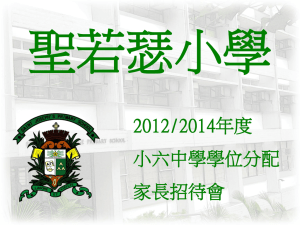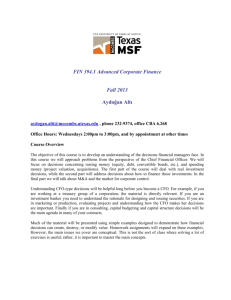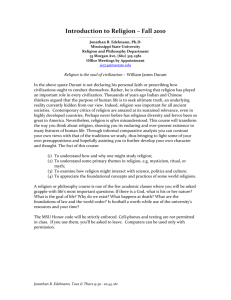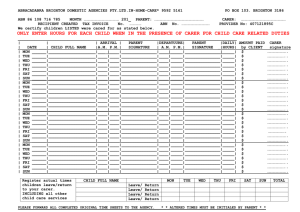CPSC 5115U- Zanev - TSYS School of Computer Science
advertisement
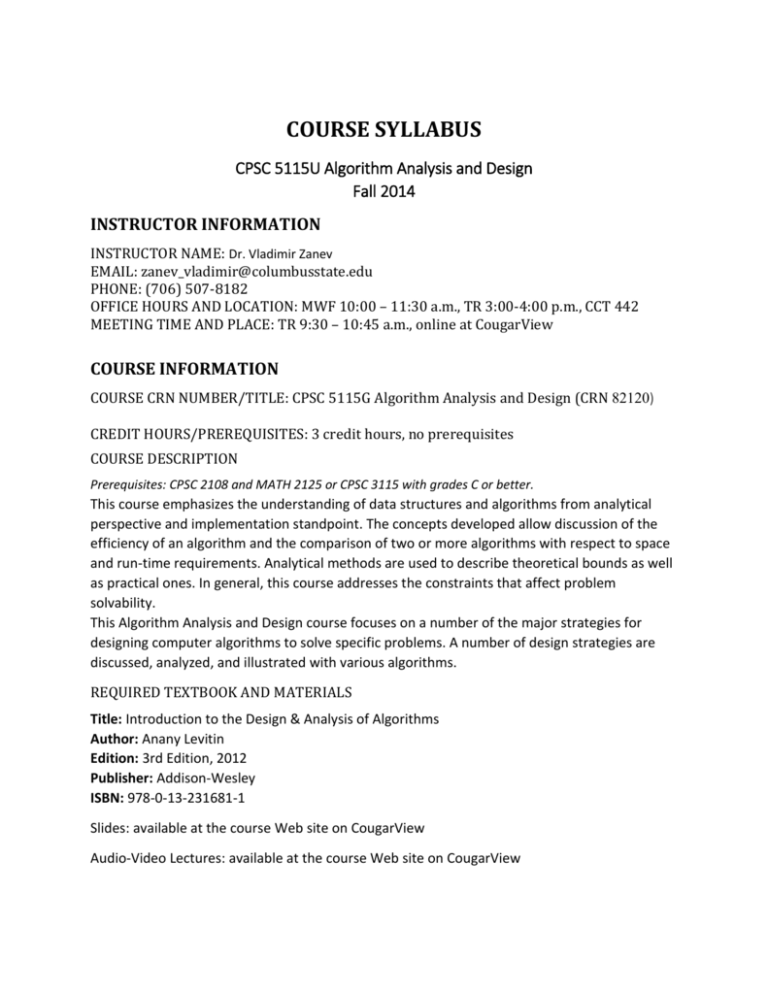
COURSE SYLLABUS CPSC 5115U Algorithm Analysis and Design Fall 2014 INSTRUCTOR INFORMATION INSTRUCTOR NAME: Dr. Vladimir Zanev EMAIL: zanev_vladimir@columbusstate.edu PHONE: (706) 507-8182 OFFICE HOURS AND LOCATION: MWF 10:00 – 11:30 a.m., TR 3:00-4:00 p.m., CCT 442 MEETING TIME AND PLACE: TR 9:30 – 10:45 a.m., online at CougarView COURSE INFORMATION COURSE CRN NUMBER/TITLE: CPSC 5115G Algorithm Analysis and Design (CRN 82120) CREDIT HOURS/PREREQUISITES: 3 credit hours, no prerequisites COURSE DESCRIPTION Prerequisites: CPSC 2108 and MATH 2125 or CPSC 3115 with grades C or better. This course emphasizes the understanding of data structures and algorithms from analytical perspective and implementation standpoint. The concepts developed allow discussion of the efficiency of an algorithm and the comparison of two or more algorithms with respect to space and run-time requirements. Analytical methods are used to describe theoretical bounds as well as practical ones. In general, this course addresses the constraints that affect problem solvability. This Algorithm Analysis and Design course focuses on a number of the major strategies for designing computer algorithms to solve specific problems. A number of design strategies are discussed, analyzed, and illustrated with various algorithms. REQUIRED TEXTBOOK AND MATERIALS Title: Introduction to the Design & Analysis of Algorithms Author: Anany Levitin Edition: 3rd Edition, 2012 Publisher: Addison-Wesley ISBN: 978-0-13-231681-1 Slides: available at the course Web site on CougarView Audio-Video Lectures: available at the course Web site on CougarView Class Sessions The CPSC 5115U class will meet regularly TR from 11:00 a.m. to 12:15 p.m. in CCT 405. The lecture topics covered in the class follow the course Schedule. See the Schedule for details. Each student is expected to attend all class lectures, to complete all scheduled textbook chapters, slides, audio-video lectures, make notes, and actively participate in the class. Assignments The assignments are homework assigned on the topics covered in the textbook chapters. They help to reinforce lectures topics covered in class, and help prepare students for upcoming lessons, assignments, projects and exams. The assignments are posted on the Assignments Web page at the class Web site. The due dates/times for the assignments are posted on the Schedule and on the Assignment Web pages. The assignments have to be submitted through the assignment dropboxes on the CougarView class site not later than midnight on the due date. Late assignments are not accepted for credit. Projects Proper design and analysis of algorithms and data structures cannot be learned simply by reading a textbook. You must practice by implementing real algorithms and data structures developing, debugging, and running computer programs. The programming projects are "handson practice" part of the course that allows developing skills and experience in algorithm design and implementation. Six programming projects about developing data structures and algorithms with Java will be assigned and graded. The programming projects, hints, grading scales, and due dates/times are posted on the Projects Web page. The projects have to be submitted through the project dropboxes on the CougarView class site not later than midnight on the due date. Late projects are not accepted for credit. Exams Two exams - Midterm and Final are scheduled. They will be take-home, problem-solving, timed exams. During the exam scheduled time you have to solve problems with algorithm design, implementation, and analysis. Take-home exams aim to allow you the opportunity to produce a well-thought out and well-written responses to problems in the area of algorithm design and analysis. Probably the biggest misconception about take-home exams is that there is no need to study anything. You should study for take-home exams just as you would for any other exam. Having books and notes to refer to might mean you don't have to memorize as much information, but you still need to be able to apply it effectively. This means you must fully understand and be familiar with the content and materials of the course, so you can find, use, and apply the appropriate information for solving a problem. Students are cautioned not to rely only on just reading the textbook and notes during exams to find the solutions and answers, as the take-home exam questions are only rarely taken directly from previous homework or classroom discussions. Take-home exams are expected to be the private work of each individual student. Under no circumstances may there be any discussion of the exam during the examination period (even if you finish before the end of the allotted period). COURSE EVALUATION The final grade will be obtained from the following: Assignments Programming Projects Midterm Exam Final Exam 30% 30% 20% 20% The letter grade will be assigned as follows: Percentage Range Final Grade 90-100% A 80-89% B 70-79% C 60-69% D 59% and below F ADMINISTRATIVE POLICIES AND ACADEMIC RESOURCES CSU DISABILITY POLICY If you have a documented disability as described by the Americans with Disabilities Act (ADA) and the Rehabilitation Act of 1973, Section 504, you may be eligible to receive accommodations to assist in programmatic and/or physical accessibility. We recommend that you contact the Office of Disability Services located in Schuster Student Success Center, Room 221, 706-5078755 as soon as possible. Students taking online courses can contact the Office of Disability services at http://disability.columbusstate.edu/. The Office of Disability Services can assist you in formulating a reasonable accommodation plan and in providing support. Course requirements will not be waived but accommodations may be able to assist you to meet the requirements. Technical support may also be available to meet your specific need. ACADEMIC INTEGRITY All students are expected to recognize and uphold standards of intellectual and academic integrity. As a basic and minimum standard of conduct in academic matters that students be honest and that they submit for credit only the products of their own efforts. Both the ideals of scholarship and the need for fairness require that all dishonest work be rejected as a basis for academic credit. They also require that students refrain from any and all forms of dishonorable or unethical conduct related to their academic work. Students are expected to comply with the provisions of Section III, "Student Responsibilities," of the Columbus State University Student Handbook. This specifically includes the sections on "Academic Irregularity," and "Conduct Irregularity." In particular, the Columbus State University Student Handbook states: “No student shall give or receive assistance in the preparation of any assignment, essay, laboratory report, or examination to be submitted as a requirement for any academic course in such a way that the submitted work can no longer be considered the personal effort of the student submitting the work.” Examples of Academic Dishonesty include but are not limited to: Plagiarism (see definition below), giving or receiving unauthorized assistance on exams, quizzes, class assignments or projects, unauthorized collaboration, multiple submissions (in whole or part) of work that has been previously submitted for credit. Plagiarism is any attempt to represent the work or ideas of someone else as your own. This includes purchasing or obtaining papers from any person and turning them in as your own. It also includes the use of paraphrases or quotes from a published source without properly citing the source. All written assignments may be submitted for textual similarity review to Turnitin.com for the detection of plagiarism. Please be aware that anyone caught cheating or plagiarizing in this class will receive a “0” for the assignment/exam and may receive a “0” for the course. STUDENT COMPLAINT PROCESS Information and resources for student complaints and academic appeals are located at the following link on the Columbus State University website http://aa.columbusstate.edu/appeals/. COURSE ATTENDANCE POLICY Attendance at all classes and other activities (lecture periods, laboratory sessions, tests, examinations, or other schedule meetings is required of every student at Columbus State University. The attendance record begins with the first meeting of the class, and one who registers late is responsible for class work missed. Student should note that the Computer Science Faculty does not initiate "class drops". A student wishing to drop should complete the official procedure before the deadline. Those who violate the attendance policy after that deadline may receive an "F" at the discretion of the instructor. After the midpoint of the quarter, no drop slip will be signed by the Dean unless extreme circumstances can be proved. TECHNICAL RESOURCES HARDWARE REQUIREMENTS How do I know if my computer will work with D2L? SOFTWARE REQUIREMENTS To complete all lessons, audio video lectures, assignments, and tests, you will need to access a computer with: Windows XP/Vista/7/8 Internet connection and a browser Speakers/headphones PowerPoint Java Version 7 Programming IDE: Java IDE (DrJava/BlueJ/Eclipse/NetBeans) If you need technical support or need assistance configuring your computer, you can refer to the link located in the "Support Resources" widget located on your "My Home" and your "Course Home" pages. If you cannot solve your problem after reviewing the knowledge base help pages, you can call help center 24-7 and talk to a Help Center agent. The number is 1-855-772-0423. OTHER How to Access the Course Web site You can access the course through CougarView at: http://colstate.view.usg.edu/ At this page, select the "Log on to" CougarView link to activate the CougarView logon dialog box, which will ask for your CougarView username and password. Your CougarView username and password are the same as your Cougarnet username and password: Username: lastname_firstname Password: XXXX Default password is your birthday in the format of DDMMYY. If you try the above and CougarView will not let you in, please use the "Comments/Problems" link on the CougarView home page to request help. If you are still having problems gaining access a day or so after the class begins, please e-mail me immediately. Once you've entered CougarView, you will see a list of courses you have access to. Once you have clicked on the course's name and accessed the particular course itself, you will find a home page with links to other sections and tools, and a menu on the left-hand side. Feel free to explore the areas in the course. Getting help Student assistants in the public Computer Center labs / Library can help you with basic computer-related problems such as logging on to the network, saving your work, etc., but they are not obligated to help you with your assignments. There are several tutors in the School of Computer Science lab (CCT450) who can help you with the assignments. Their schedule is posted in the Computer Science School. You can always contact me during my posted office hours, by e-mail, or by appointment. Discussion Etiquette CSU is committed to open, frank, and insightful dialogue in all of its courses. Diversity has many manifestations, including diversity of thought, opinion, and values. Students are encouraged to be respectful of that diversity and to refrain from inappropriate commentary. Should such inappropriate comments occur, I will intervene as I monitor the dialogue in the discussions. I will request that inappropriate content be removed from the discussion and will recommend university disciplinary action if deemed appropriate. Students as well as faculty should be guided by common sense and basic etiquette. The following are good guidelines to follow: Never post, transmit, promote, or distribute content that is known to be illegal. Never post harassing, threatening, or embarrassing comments. If you disagree with someone, respond to the subject, not the person. Never post content that is harmful, abusive; racially, ethnically, or religiously offensive; vulgar; sexually explicit; or otherwise potentially offensive. Student Responsibilities As a student in this course, you are responsible to: attend class regularly manage his/her time and maintain the discipline required to meet the course requirements read from the textbook, slides all topics covered in the class, and listen to the audiovideo lectures execute all assignments, to develop and deliver in time all programming projects adhere to all course deadlines and actively participating in classroom discussions take the Midterm and Final exams as they are scheduled in the course schedule. “I didn’t know” is NOT an acceptable excuse for failing to meet the course requirements. If you fail to meet your responsibilities, you do so at your own risk. COURSE SCHEDULE Week Dates Week 1 Textbook Lecture Topics, Online Camtasia Lectures, Slides 08/19, Tue Class organization and administration 08/21, Thu Chapter 1. Introduction; slides; online CM lecture Assignments, Programming Projects, Exams Week 2 08/26, Tue 08/28, Thu Chapter 1. Introduction; slides; online CM lecture Chapter 2. Fundamentals of the Analysis of Algorithm Efficiency; slides; online CM lecture Assignment 1 due on 08/28, Thu Week 3 09/02, Tue 09/04, Thu Chapter 2. Fundamentals of the Analysis of Algorithm Efficiency; slides; online CM lecture Chapter 2. Fundamentals of the Analysis of Algorithm Efficiency; slides; online CM lecture Week 4 09/09, Tue 09/11, Thu Chapter 3. Brute Force; slides; online CM lecture Chapter 3. Brute Force; slides; online CM lecture Assignment 2 due on 09/09, Tue Chapter 4. Decrease-and-Conquer; slides; online CM lecture Chapter 4. Decrease-and-Conquer; slides; online CM lecture Assignment 3 due on 09/16, Tue Chapter 5. Divide-and-Conquer; slides; online CM lecture Chapter 5. Divide-and-Conquer ; slides; online CM lecture Assignment 4 due on 09/23, Tue Week 5 09/16, Tue 09/18, Thu Project 1 due on 09/18, Thu Week 6 09/23, Tue 09/25, Thu Week 7 09/30, Tue 10/02, Thu Chapter 5. Divide-and-Conquer; slides; online CM lecture Chapter 6. Transform-and-Conquer; slides; online CM lecture Review for the Midterm Exam Assignment 5 due on 10/02, Thu Week 8 10/07, Tue 10/09, Thu Review for the Midterm Exam Midpoint of Semester. Midterm Exam Project 2 due on 10/ 07, Tue Midterm Exam on October 9th, Thu Week 9 10/14, Tue 10/16, Thu Fall Break. No classes. Chapter 6. Transform-and-Conquer; slides; online CM lecture Week 10 10/21, Tue 10/23, Thu Chapter 6. Transform-and-Conquer; slides; online CM lecture Chapter 7. Space and Time Tradeoffs; slides; online CM lecture Assignment 6 due on 10/23, Thu Week 11 10/28, Tue 10/30, Thu Chapter 7. Space and Time Tradeoffs; slides; online CM lecture Chapter 8. Dynamic Programming; slides; online CM lecture Assignment 7 due on 10/30, Thu Week 12 11/04, Tue 11/06, Thu Chapter 8. Dynamic Programming; slides; online CM lecture Chapter 9. Greedy Technique; slides; online CM lecture Project 3 due on 11/04, Tue Assignment 8 due on 11/06, Thu Week 13 11/11, Tue 11/13, Thu Chapter 9. Greedy Technique; slides; online CM lecture Chapter 12. Coping with the Limitations of Algorithm Power; slides; online CM lecture Assignment 9 due on 11/13, Thu Week 14 11/18, Tue Chapter 12. Coping with the Limitations of Algorithm Power; slides; online CM lecture Chapter 12. Coping with the Limitations of Algorithm Power; slides; online CM lecture Project 4 due on 11/18, Tue Chapter 11. Limitations of Algorithm Power; slides; online CM lecture Thanksgiving Break. No classes Project 5 due on 11/25, Tue Project 6 due on 12/02, Tue 12/04, Thu Chapter 11. Limitations of Algorithm Power; slides; online CM lecture Review for the Final Exam 12/10, Wed Final Exam on Wednesday, December 10th Final Exam on Wed, December 10th 11/20, Thu Week 15 11/25, Tue 11/27, Thu Week 16 12/02, Tue

